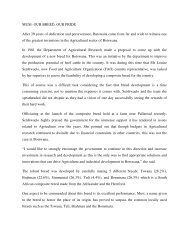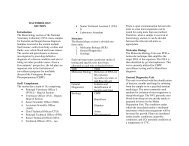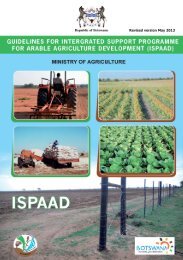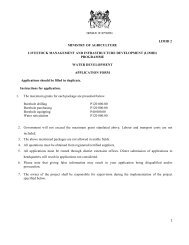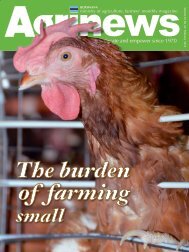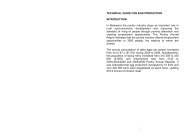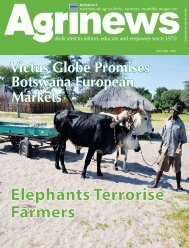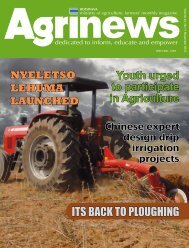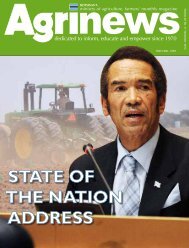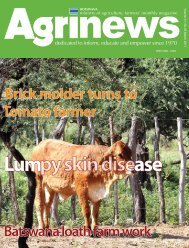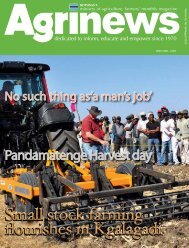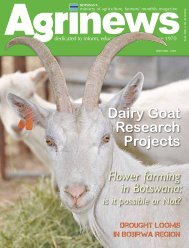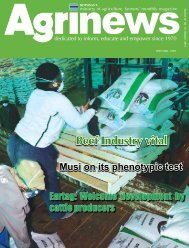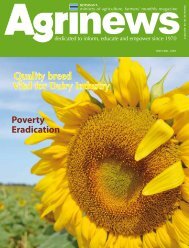GHANZI SHOW - Ministry of Agriculture
GHANZI SHOW - Ministry of Agriculture
GHANZI SHOW - Ministry of Agriculture
Create successful ePaper yourself
Turn your PDF publications into a flip-book with our unique Google optimized e-Paper software.
NATIONAL FRUIT TREE<br />
NURSERY GROWS<br />
Botswana is one<br />
<strong>of</strong> the countries<br />
that still import<br />
fruits and vegetables<br />
from other countries<br />
especially South<br />
A f r i c a a t v e r y<br />
costly price. This<br />
has brought about<br />
the idea to establish a<br />
national fruit tree nursery<br />
at Ditladi village, 9km east<br />
<strong>of</strong> Tonota village. The national<br />
year demand for orange trees is<br />
6000, mangoes, leaches and<br />
paw paw stands at 2000.<br />
The national fruit tree nursery<br />
manager, Ms Velleminah<br />
Pelokgale, says “the nursery<br />
was established to among others,<br />
increase fruit production through<br />
establishments <strong>of</strong> orchards in Botswana,<br />
monitor national fruit tree production,<br />
market needs and to generate income.”<br />
The National Fruit Tree Nursery was also<br />
made to develop standards <strong>of</strong> seedlings<br />
quality and evaluating species, provenances,<br />
varieties and other germ plasm through the<br />
establishment <strong>of</strong> gene bank and mother<br />
rootstock blocks. Furthermore, the project<br />
is intended for technical and leadership<br />
capacity building. Pelokgale states that<br />
since its establishment in 2003/4, the<br />
project has promoted a number<br />
<strong>of</strong> projects in the country.<br />
Adding that farmers come<br />
from all over the country,<br />
as far as Okavango and<br />
Tsabong to buy fruit<br />
trees. She reveals that<br />
they propagate fruit trees<br />
seedlings, especially citrus<br />
and mangoes in order<br />
to reduce importation<br />
<strong>of</strong> fruit trees seedlings<br />
from foreign nurseries,<br />
which is expensive to the<br />
government and individuals.<br />
She adds that the nursery users include<br />
nursery operators themselves, individuals,<br />
community organisations, farmers groups,<br />
government agencies and non governmental<br />
organisations including corporate, private<br />
and other stakeholders.<br />
The national fruit tree nursery which is<br />
situated in a 27 hectares area is divided into<br />
four operational divisions which comprise<br />
<strong>of</strong> root stock area which is four hectares and<br />
currently is planted with 182 Eureka lemons<br />
and rough lemons; three hectare gene bank<br />
planted with assorted 263 citrus, 45 table<br />
grapes and 58 olives. The other area is for<br />
mother block and the potting/progation area.<br />
The national fruit tree nursery is located in<br />
a very fertile flat area with good drainage and<br />
good soils and proximity to the Shashe river<br />
where the farm draws its water. The manager<br />
says that the area is readily accessible, which<br />
makes it a good venue for training and field<br />
visits by students from various institutions,<br />
nursery operators and interested groups. She<br />
also reveals that the staff <strong>of</strong>ten act as trainers<br />
and commonly is accomodative and willing<br />
to assist. Pelokgale adds that the area’s semimodern<br />
infrastructure complimented by<br />
moderately trained staff ensures that their<br />
small industrial nurseries are outstanding<br />
training venues for basic and advanced<br />
nursery propagation techniques.<br />
“The extensive nursery facility was<br />
established to achieve the staggering seedling<br />
and land rehabilitation in Botswana.”<br />
The nursery imports cuttings from South<br />
Africa and later multiplies them. She says<br />
that they follow international importation<br />
bilateral laws and rules, adding that they<br />
only buy from accredited nurseries. And that<br />
only the government through the <strong>Ministry</strong> <strong>of</strong><br />
<strong>Agriculture</strong> imports such plants. Pelokgale<br />
reveals this is to ensure no plants from non<br />
accredited nurseries cross into the coutry.<br />
The main reason being to avoid diseases,<br />
pests like fruit fly crossing over. She says<br />
that it would not be easy to control such<br />
if individuals were to import on their own,<br />
stating that with individuals anything could<br />
happen.<br />
Ms Pelokgale posits that the project faces a<br />
Ms Vellemiah Pelokgale says there is a high<br />
demand for citrus plants countrywide<br />
number <strong>of</strong> challenges. She says that it is very<br />
expensive to run the nursery adding that it<br />
is incomplete. She adds that the netshadings<br />
need to be paved inside. She says that if the<br />
area was paved it was going to be easy to<br />
disinfect after taking out stock. She also says<br />
that dry land encourages weeds to grow<br />
rapidly as opposed to a green house where<br />
they would not survive because they are not<br />
used to such conditions.<br />
She adds that unpaved floors also result<br />
in sinking, rusting, breaking <strong>of</strong> nursery table<br />
legs and base,resulting in high maintenance<br />
costs. She says that insects are also a<br />
menace adding that termites also harass<br />
their plants. She, however, controls them<br />
by digging out anthills, burning them and<br />
putting insecticides. She posits that there are<br />
incidences <strong>of</strong> non migratory pests such as<br />
thrips,scales,orange dogs, grasshopper and<br />
fruitfly. She also says that as a precautionary<br />
measure to avert diseases they disinfect at<br />
the main gate and at entrances to the green<br />
houses. She says this would avoid carrying<br />
in diseases that might be trapped in shoes<br />
and tyres. The fruit tree nursery develops<br />
citrus/orange varieties like palmer navel,bah<br />
navel, delta valencia, midnite valencia,<br />
maclean,impress mandarine,minowasi<br />
mandarine. Mangoes-tommy atkins, kent,<br />
reitz,zeal. Avocado; mexican and indiana.<br />
Olives; mission corithian. Bananas chinese<br />
dwarf. Peaches; omsreal.<br />
Joel Kokwere says they need funds<br />
to pave tunnels.<br />
13<br />
July 2012



